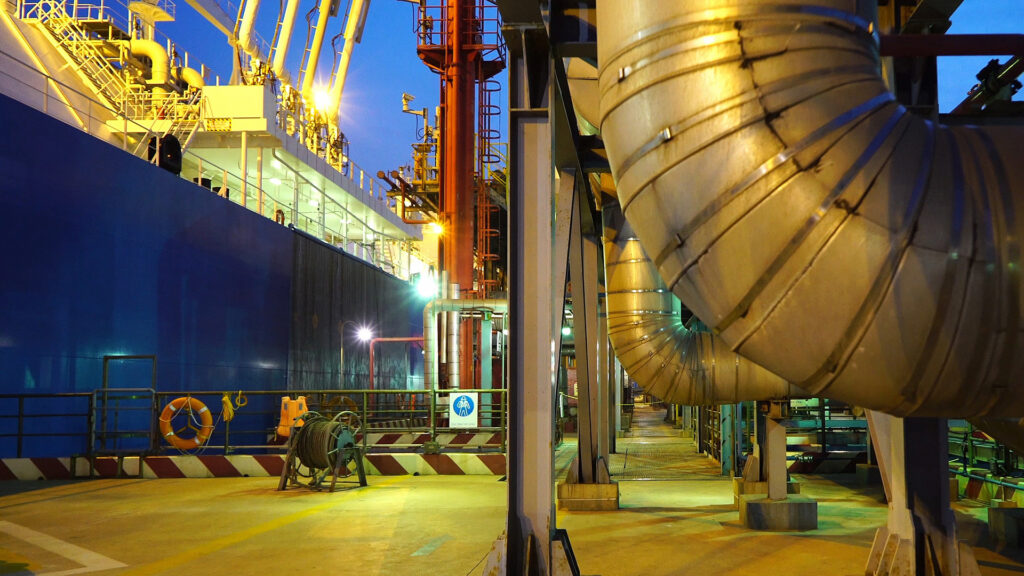The Eagle and the Dragon: The context, implications and legality of the latest US – China tariffs, April 2018
Trump’s recent steel and aluminium tariff measures – which will mainly affect Chinese goods – may deliver a ratings boost before the 2018 midterm elections. However, the counter tariffs imposed by China, and the further tech tariffs threatened by Trump may lead to a trade war.
But is it sensible to play politics with protectionism? Are the tariffs legal under WTO rules? And is a rise in global protectionism likely to affect post-Brexit Britain? The impact of a US – China trade war on the soft commodities markets in particular is a cause for concern – what are the contractual implications for traders?
What are the tariffs?
On 22 March 2018, President Trump announced tariffs of up to US$60 billion on Chinese imports in response to alleged intellectual property theft1. The announcement was made the day before an order imposing 25% tariffs on steel imports and 10% tariffs on aluminium imports into the US took effect.
On 2 April 2018, in retaliation, China imposed tariffs of up to 25% on 128 US imports2. President Trump is set to impose a second round of tariffs related to intellectual property3, as are China4
Who will it affect?
The US measures will mainly affect China. The US$60 billion package of tariffs is specifically targeted against China, and China is one of the few major steel and aluminium producing countries that will not benefit from an initial exemption from the steel and aluminium tariffs. China is also the largest producer of solar panels5 and the largest exporter of washing machines to the US6, and the Trump administration has already imposed global safeguard tariffs on imports of these products in 2018. Other countries will be affected by the tariffs too. The reprieve from the US steel and aluminium tariffs that will apply to a number of countries – including countries in the EU – is only expressed to be temporary. Duties may still be imposed against the exempted countries, depending on the outcome of further negotiations which are due to be concluded by 1 May 2018. In addition, the Trump administration has reported that it may impose quotas against the countries benefitting from the exemption.
The Chinese measures, imposed on 2 April 2018 will affect only the US, impacting goods such as fruit, nuts and steel pipes7.
The further measures threatened by both countries are more far-reaching, with the US threatening tariffs on medicine and technology and China counter-threatening further tariffs on major US goods into China such as cars, soybean and wheat8, with reports saying “almost half of the record $130bn in exports to China last year could be exposed to retaliatory duties“9.
Is it sensible to play politics with protectionism?
“There is no instance of a nation benefitting from prolonged warfare” – Sun Tzu, The Art of War.
Trade wars are far from novel. Duties on products imported into the US are generally considered to be a cause of the American Revolutionary war. Upon independence, the second act passed under the 1789 Constitution in the US was a Tariff Act, imposing duties on imports of goods into the US. One of its stated purposes was to encourage and protect US manufacturers: steel imports were taxed heavily10.
Given the huge growth in international trade since the Second World War, supported by the rules of the WTO, and its precursor, the General Agreement on Tariffs and Trade (GATT) – which still forms an important part of WTO rules – it has become easy to take a relatively open global trading system, and the progressive reduction of trade barriers, for granted.
However, there are signs that the free trade consensus is faltering, which could have a significant impact on global trade volumes. President Trump’s tariffs, and China’s response, follow the withdrawal of the US from negotiations to establish a free trade area in the Pacific region11, the breakdown in negotiations for a free trade agreement between the US and the EU12, and the failure of the Doha Round of WTO talks13.
One of the major risks of protectionism, particularly when targeted at products in widespread use like steel and aluminium, is that the detriment to domestic manufacturers using the targeted product outweighs the advantage to domestic manufacturers producing the targeted product. This can have political as well as economic consequences.
Trump’s steel and aluminium tariffs are similar to steel tariffs introduced by President George W. Bush in 2002. It has been argued that those tariffs were motivated by politics rather than economics, particularly as major steel producing states such as West Virginia and Pennsylvania are also ‘swing states’ in US elections14. One effect of President Bush’s steel tariffs was a backlash from steel users. An association of raw material users commissioned a report claiming that 200,000 US jobs were lost as a result of the tariffs15, and the National Association of Manufacturers ended up opposing the tariffs16.
In addition, retaliatory measures against the relevant product by other countries that manufacture the product could quickly reverse any initial advantage to domestic manufacturers (leaving aside the question of whether such retaliatory measures, if imposed, would conform to the WTO rules).
History has demonstrated that there are significant economic and political risks involved in playing politics with protectionism.
Are the tariffs legal?
One of the purposes of the WTO is to avoid trade wars. Each member of the WTO – including the US and China – has a tariff schedule listing the maximum tariff it will apply to a particular product. Generally, WTO members should apply the same tariff for a particular product to the products of all other WTO members.
President Trump’s tariff measures impose tariffs on certain products that are higher than those allowed in the US’ WTO tariff schedule. Certain measures also discriminate between different WTO Members (such as the measures imposed on China).
The US has relied on a wide range of domestic legislation to impose the tariffs. For example, the safeguard duties on solar panels and washing machines were introduced pursuant to Section 201 of the Trade Act 1974. Whilst controversial, and often successfully challenged at the WTO, safeguard measures are imposed relatively regularly by a number of countries, and are permitted under WTO rules if an investigation can establish that a spike in imports of a particular product is causing or threatening to cause serious injury to the domestic industry.
The two pieces of legislation that have been relied upon to impose the steel and aluminium tariffs and the US$60 billion in tariffs against Chinese goods are more obscure, and highly contentious.
The steel and aluminium tariffs follow an investigation brought under Section 232 of the Trade Expansion Act 1962. This allows measures to be taken if it is determined that the import of a particular product in a particular quantity threatens to impair national security.
It is questionable whether the use of this domestic law will be found to be in conformity with WTO rules. The WTO permits an increase in tariffs above the maximum level a WTO member has committed to in its tariff schedule in certain circumstances. One of these exemptions – contained at Article XXI of the GATT – relates to national security considerations.
An interpretation of the Article XXI national security exemption is that it can be used at a WTO member’s discretion, i.e. it is subjective, as the national security exemption refers to security measures that the WTO member “considers” necessary. Another interpretation is that a WTO member must justify its use objectively17. Given that China has indicated that it may challenge the tariffs before the WTO’s Dispute Settlement Body, it is likely that this issue will have to be determined18.
If the subjective interpretation were confirmed, there is a danger that this would encourage countries to make more frequent use of the national security exemption – particularly with regard to strategic commodities. As it could be used as a tactic in trade wars, it would appear to undermine the purpose of WTO rules.
If the Dispute Settlement Body adopted an objective approach, then, in the present case, it is likely that the US would have to show that the measures taken were necessary for the protection of its essential security interests relating to the traffic in goods carried on directly or indirectly for the purpose of supplying a military establishment. It would also probably have to show that it was permitted to impose the duties against certain WTO members (such as China) but not others.
Given that the question of the legality of the tariffs rests on disputed interpretation of a WTO provision it is currently not possible to say whether the measures are legal or not: it certainly should not be assumed that they are illegal. Imposing immediate retaliatory measures in case tariffs are imposed are therefore risky: such retaliatory measures could themselves contravene WTO rules, especially if the US tariffs are determined to be legal19.
Specifically, the US$60 billion in duties brought against Chinese goods for alleged intellectual property violations have been imposed under Section 301 of the Trade Act 1974. This allows the President to take appropriate action to obtain the removal of any practice of a foreign government that violates an international trade agreement or is unjustified, unreasonable or discriminatory, and that burdens and restricts US commerce.
Whilst the US is likely to argue that the tariffs can be justified under Article XX(d) of the GATT – which allows a WTO member to raise tariffs in order to secure compliance with intellectual property laws – the use of Article 301 is likely to be challenged. The WTO has previously ruled that the existence of Article 301 does not contravene WTO rules. However, it has also indicated that the use of Article 301 may only be legal if it is used following a WTO determination that the practices which it targets are inconsistent with WTO rules20. Given that there may be no WTO determination that authorises the use of Article 301, there are strong arguments that the tariff measures against China will be held to have been imposed in contravention of WTO rules.
The Chinese retaliatory tariffs may also come under the spotlight of the WTO Dispute Settlement Body. Whilst one WTO member may ‘retaliate’ against another WTO member by suspending certain concessions in certain circumstances, it is unclear whether the Chinese retaliatory tariffs will meet these conditions. The determination of this issue is likely to rest on whether the US steel and aluminium tariffs, which have been imposed on the stated ground of national security, are actually disguised safeguard tariffs, as China currently argues21.
Is a rise in global protectionism likely to affect post-Brexit Britain?
One of the consequences of Brexit will be that the UK will be able to enter into its own free trade agreements, assuming that – as is the UK Government’s current intention – the UK will no longer remain a part of the EU Customs Union22. In a protectionist environment this may not be regarded as a great advantage: potential partners may be reluctant to enter into free trade agreements.
Negotiating free trade agreements is far from easy at the best of times. Unexpected, seemingly trivial issues may cause delays – witness the current dispute in negotiations between the EU and Mexico over whether manchego cheese can be produced in Mexico23.
However, despite the recent rise in the political capital of protectionism, and the increased difficultly of multilateral liberalisation through the WTO, it is unlikely that the UK will be short of options for free trade partners following Brexit. Countries including Australia have indicated a willingness to enter into a free trade deal with the UK, and new, relatively comprehensive trade deals such as the succinctly titled Comprehensive and Progressive Agreement for Trans-Pacific Partnership (which the UK Government has expressed an interest in joining) are still being concluded24.
Two big questions will remain open however: (i) will the UK – as a net exporter of services25 – be able to achieve significantly enhanced access in services through its free trade agreements, given that enhanced services access is generally more difficult to achieve than enhanced access for goods, and (ii) will the benefits of future free trade agreements for the UK outweigh the disadvantages of leaving the EU?
Global reaction to the tariffs: present and future
The global reaction to the US’ tariff announcements has so far has been mixed.
When the US first announced tariffs on steel and aluminium on the EU and others, the EU responded with counter-measures to impose tariffs on products from sweetcorn and cranberries, to cigars and bourbon, as well as make-up, bed linen, ventilators and motor boats. If introduced, “swathes of US-made or grown products [would] face steep new charges when sold into the EU26.
In an immediate response to the US announcement of the US$60bn package of tariffs on Chinese goods, China’s commerce ministry said it was ready to retaliate: “China will not sit idly by and let its legitimate rights and interests be harmed, and will certainly take all necessary measures to resolutely defend its legitimate rights and interests”.27 It seems that now, following such comments, China has taken the “necessary measures” it was threatening, albeit in a more modest fashion. However, it remains to be seen if China will “follow its opening gambit with stronger measures”28.
Other countries which have trading relationships with the US have expressed regret at the ancillary impacts that a potential trade war may have. For example, Japan’s Trade Minister has indicated that Japan “will study necessary responses within the framework of the WTO”29.
Some countries have tried to negotiate. South Korea, which is the third largest importer of steel into the US, has agreed to restrict its steel exports and to rewrite part of its bilateral trade deal with the US.30
Focus on Soft Commodities: assessing and addressing the risks in your contracts
As the initial steel and aluminium tariffs have now seemingly escalated into a trade war, commodities businesses are likely to be in the front line as strategic commodities can often be useful weapons. Although the initial focus was on steel and aluminium contracts, it is important to bear in mind the potential impact of retaliatory action (back and forth) in relation to other commodities, as it seems now, soybean, wheat and even cotton could be caught up in retaliatory trade warfare.
For our views on mitigating risks in existing contracts and being prepared as to future contracts, please see our article http://www.hfw.com/Forewarned-is-forearmed-what-are-the-risks-if-tariffs-spark-a-trade-war-and-how-can-you-prepare-March-2018
The growing concern is well placed. China was the third largest market for US exports in 2016 and is among the biggest buyers of American corn and soybeans31 – the US ships about US$14 billion worth of soybeans to China each year, according to the US Department of Agriculture.32 The American Soybean Association indicated its members’ concern that US soybeans may be a “prime target” for retaliatory action33 and China’s Global Times newspaper has already called for restrictive measures to stop US soybean “dumping” in China. A meeting in Washington to discuss the implications of a possible trade war with China was scheduled for 30 March 2018 between US interests, including the American Soybean Association, and Trade Representative Robert Lighthizer.34
Prior to the recent pause in the imposition of US tariffs on EU steel and aluminium, GAFTA was urging members to participate in the European Commission’s consultation on possible EU retaliation measures (which closed on 26 March 2018). It expressed particular concern that one third of the items on the first list of target products published were agricultural products which could be subject to 15% additional import duties under proposed EU retaliatory measures. GAFTA was cooperating with other similar organisations, such as Coceral, the European association representing the soft commodities trade, in its response to the consultation. Whilst concerns in relation to the EU soft commodities market may have lifted for the time being, concerns about the Chinese market will have intensified.
What should traders be aware of if soft commodities are targeted in any tariff war? It is easy to become so familiar with trading on widely used standard terms that one does not weigh up all the implications of doing so at the negotiation stage. A number of the standard contracts and trading terms used in soft commodity trading already provide for the allocation of payment of tariffs by the parties, including GAFTA and FOSFA contracts and Incoterms 2010. For example:
- The FOSFA standard contract for soybeans in bulk, provides at clause 20 that: “All import duties, taxes, levies, etc., present or future in port of discharge/country of destination shall be for Buyers’ account.” (emphasis added) If China were to impose import duties on US soybeans, the buyer on these FOSFA terms would bear the cost of those duties.
- GAFTA Contract No.27 for Canadian and US Grain, clause 14 provides that “all import duties, taxes, levies, etc., present or future, in country of destination, shall be for Buyers’ account” (emphasis added). Accordingly, if any country where a trading partner is based decided to hike up import duties for US grain, the buyer on Contract No. 27 terms, would be liable to pay the additional costs.
- If goods are sold on “Free on Board (FOB) terms, the seller must pay “all duties, taxes and other charges payable upon export” and the buyer must pay all duties, taxes and other charges… payable upon import of the goods”. For goods sold on “Ex Works” (EXW) terms, both export and import duties are usually for the buyer’s account.
Parties trading on standard terms should be aware of the obligations they are accepting and soft commodity traders should be on particular alert in relation to tariff costs when entering new contracts. When negotiating any new contract, the key English law principle to bear in mind is that of freedom of contract. As observed by Lord Diplock: “A basic principle of the common law of contract … is that parties to a contract are free to determine for themselves what primary obligations they will accept”35
Clear allocation of risk – and a reflection of those risks in the pricing – can help both parties clearly and fully understand the bargain they have struck before committing to a contract. Although standard contracts may assist in allocating such risk, there is no substitute for a bespoke clause to deal specifically with issues such as potential trade wars and “tariffs” and/or to perhaps share some of the risks.
Conclusions
Although some are calling the recent events a “trade spat” and not a “trade war”36, concerns among commodities traders remain high, especially following the counter-measures imposed by China.
It will be interesting to see whether the WTO can fulfil its purpose and avert a full trade war. It certainly seems likely that the US tariffs – and the retaliatory tariffs imposed by WTO members – will be met with a legal challenge at WTO level. In the meantime, all those likely to be affected, which could be parties within a number of different industries, should make preparations to manage and mitigate against the changing trade landscape.
For further information, please contact the authors of this briefing:
Brian Perrott
Partner, London
T +44 (0)20 7264 8184
E brian.perrott@hfw.com
Anthony Woolich
Partner, London
T +44 (0)20 7264 8033
E anthony.woolich@hfw.com
Footnotes
- https://www.cnbc.com/2018/03/22/trump-moves-to-slap-china-with-50-billion-in-tariffs-over-intellectual-property-theft.html.
- http://www.bbc.co.uk/news/world-asia-43614400
- http://www.bbc.co.uk/news/world-us-canada-43622862
- https://www.ft.com/content/42fb1100-378f-11e8-8eee-e06bde01c544
- http://www.energydigital.com/renewable-energy/top-10-solar-producing-countries.
- https://en.wikipedia.org/wiki/Trump_tariffs.
- http://www.bbc.co.uk/news/world-asia-43614400
- https://www.reuters.com/article/us-usa-trade-china-tariffs-statement/china-announces-additional-tariffs-on-50-billion-of-u-s-goods-idUSKCN1HB0W6
- https://www.ft.com/content/42fb1100-378f-11e8-8eee-e06bde01c544
- https://en.wikisource.org/wiki/United_States_Statutes_at_Large/Volume_1/1st_Congress/1st_Session/Chapter_2.
- https://ustr.gov/about-us/policy-offices/press-office/press-releases/2017/january/US-Withdraws-From-TPP.
- https://www.economicswire.net/ttip-is-abandoned-for-uncertain-period.html.
- https://www.nytimes.com/2016/01/01/opinion/global-trade-after-the-failure-of-the-doha-round.html.
- http://www.nytimes.com/2002/03/14/business/us-admits-that-politics-was-behind-steel-tariffs.html?pagewanted=all&src=pm.
- http://www.tradepartnership.com/pdf_files/2002jobstudy.pdf.
- https://theconversation.com/george-w-bush-tried-steel-tariffs-it-didnt-work-92904.
- For a fuller discussion of the interpretation of the national security exemption, see http://bruegel.org/2018/03/u-s-steel-and-aluminum-tariffs-how-should-the-eu-respond/.
- https://www.theguardian.com/world/2018/mar/22/eu-expects-escape-trump-steel-aluminium-tariffs-talks.
- https://www.ft.com/content/e3771a6e-20cb-11e8-a895-1ba1f72c2c11.
- United States – Sections 301 – 310 of the Trade Act of 1974 – Panel Report, WT/DS152/14.
- http://www.foodingredientsfirst.com/news/us-china-tariff-spat-escalates-on-food-products-dairy-deal-signed.html.
- http://www.bbc.co.uk/news/uk-politics-42938672.
- https://www.telegraph.co.uk/news/2018/01/15/row-manchego-could-scupper-eu-trade-deal-mexico-spain-calls/.
- https://international.gc.ca/trade-commerce/trade-agreements-accords-commerciaux/agr-acc/cptpp-ptpgp/index.aspx?lang=eng.
- https://www.ons.gov.uk/economy/nationalaccounts/balanceofpayments/bulletins/uktrade/january2018.
- https://www.telegraph.co.uk/business/2018/03/16/eu-prepares-sweeping-tariffs-hundreds-us-imports-cranberries/
- http://www.bbc.co.uk/news/business-43494001
- http://www.bbc.co.uk/news/world-asia-43614400
- https://www.japantimes.co.jp/news/2018/03/09/business/amid-gop-outcry-trump-rolls-big-trade-tariffs-spares-mexico-canada-now/#.WrFo9E1LGUk
- https://www.ft.com/content/92340f76-3274-11e8-b5bf-23cb17fd1498
- http://www.bbc.co.uk/news/business-43494001
- https://www.cnbc.com/2018/03/21/chinese.html
- http://www.agrinews-pubs.com/news/asa-chinese-say-u-s-soybeans-prime-target-for-trade/article_a2154c12-5101-5542-9f1c-770984609447.html
- http://www.scmp.com/news/china/article/2139360/us-and-china-talks-shield-soybeans-and-other-farm-products-trade-war
- Eurico SpA v Philipp Brothers [1987] 2 Lloyd’s Rep. 215, 218
- https://www.bloomberg.com/view/articles/2018-03-26/trump-and-china-are-in-trade-spat-not-tariff-war










-1024x683.jpg)